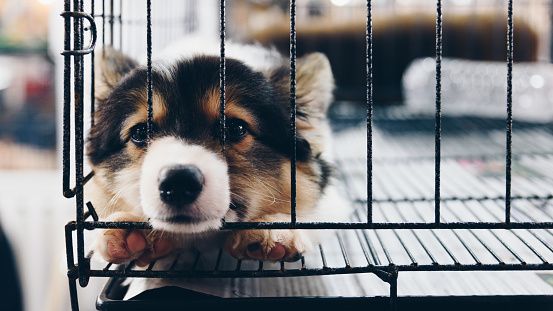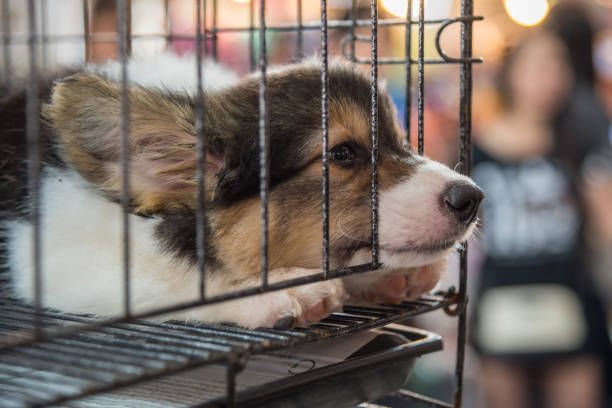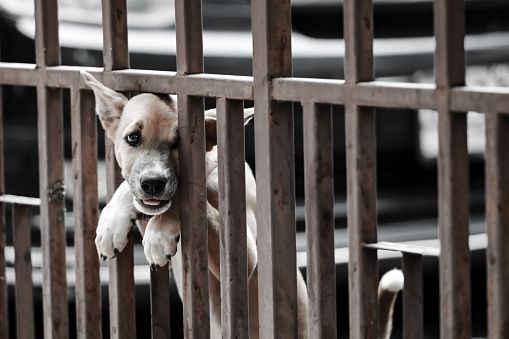The Brutality of Puppy Mills
Puppy Mills are dog farms where dogs are treated as livestock for sale. Puppies are not considered living creatures by breeders and receive no affection.You can report this action if you have solid evidence.

You may have noticed that online shops and pet stores sell adorable pets everywhere. But have you ever paused to consider where those pups originated? Do you believe the business owners produced all those dogs by themselves? Perhaps, the reality may be crueler than you imagine. However, if you love dogs, especially puppies from pet stores, you can discover some information about your pets and the brutality involved with puppy mills.
Page Contents
What is Puppy Mill?
A puppy mill business began around the mid-1960s. It was right after World War II, when the mass crop failure, the United States Agriculture Department started to promote puppies as a replacement for harvest failure. Pet stores and local veterinarian clinics began to appear when the demand for dogs grew. However, there was no standardized definition of Puppy Mills until 1984. It is a dog farm where dogs are treated as livestock for sale. Puppy mills are everywhere. In the past, there were between 2000 and 3000 breeders in the US with a USDA license. However, due to the large number of unregistered breeders that operate illegally, this number is not correct. Until now, puppy mills sold around 2 million licensed and unlicensed puppy mills in the United States.
Are Puppy Mills Illegal?
Puppy mills are regarded as legitimate businesses. However, they are still in operation due to public demand. They abuse these pups to make a profit by taking advantage of those who love dogs. Even though puppy mills are considered a legal business, it is still cruel to treat those dogs as livestock for selling. There are many petitions and support services to stop puppy mills from operating. However, few people considered the ugly truth of how those cute puppies in the pet store came to be. Therefore, it is your job to spread words about the abuse and unfairness of puppy mills to the public.
The Living Conditions

Unlike the private breeders, the farm puppies live in unhealthy conditions. Dogs are not considered living creatures by breeders and receive no affection. Puppies are only fed with poor food and get simple showers. Dogs have no grooming, nail clippings, or teeth brushing. There are also no regular checkups for the pups because it is costly. Without health care, the dogs get sick often from sickness and spread diseases. As they wait to be bred and sold, they are kept in cages continually for long periods.
The Breeding Process
The breeding process is inhumane. Even when the adult female dogs are injured, they are still bred continuously. The dogs in puppy mills are poorly treated and continually bred until they cannot. Unlike private breeders, puppy mills keep breeding the dogs regarding their breeds or personality traits. For instance, they even breed dogs with aggressive characteristics. Breeding facilities are also poorly constructed. The pregnant dogs receive no medical attention. Pregnant dogs are delicate to their surroundings, leading to miscarriage and difficult delivery. After being born, the pups will be separated from their mothers as soon as there are sales. Because they are animals, separations during early stages may be taken lightly. Still, it proves that abrupt mother-puppy separations induce stress, anxiety, and incontinence in the young pups. Puppy mills will sell the dogs regardless of their age.
The Psychological Effects
In the puppy mill industry, dogs are infamously mistreated. Puppies are viewed as livestock in Amish communities. Dogs from puppy farms are all displaying hyper fear and not socializing. They are sometimes aggressive to people and strangers. The physiological traits of the puppies saved from puppy mills include becoming extremely fearful, being on high alert, and being easily frightened. In rescued puppies, grooming, eating, and walking are performed repetitively and exaggeratedly. In addition to experiencing constant terror, the harmed puppies have difficulty adjusting to new living surroundings. Many people have claimed that puppies from puppy mills suffer from severe injuries and adverse psychological effects. Some ended up living like fearful dogs and even said their souls were shattered.
How Puppy Mills Make Profits

Puppy mills are selling to two primary sale outlets. First, the puppies will be sold online and sold to pet stores. Puppies are made to tolerate the long truck travel when being sent to new owners. They are forced to remain in their cages in extremely cold or hot environments, all alone. Most pups sold at pet stores come from puppy farms. Pet shops often use the phrase "adopt" to deceive customers. Purchasing pups from puppy mills is the same as supporting an immoral business. It is better to adopt dogs rather than buy them. Puppy mills and scammers are taking advantage of people that love dogs and are obsessed with online shopping. There is nothing wrong with buying dogs from pet stores. However, ensure you are familiar with the puppy-raising process and request to inspect the Puppy's mother's living space. Private breeders are proud of the way they raise their dogs, so you can tell whether it's a scam or not by looking at the pups' living arrangements.
Ways to Stop Puppy Mills
Here are ways to report puppy mills. Remember only to report when you have seen solid evidence of puppy abuse. Otherwise, it is not regarded as an illegal business. Report to the local animal support, police or sheriff's department, etc. Puppy farms need to be eliminated, but by raising awareness, we may gradually stop the operation of such a cruel business. You may also use your network to raise awareness of the puppy mill industry.
You may visit these websites to report Puppy Mills' abuse:
The Humane Society of the United States is the country's most successful animal protection group. They have been working to preserve all animals since 1954 via advocacy, instruction, and practical activities.
Report a puppy mill | The Humane Society of the United States
APHIS employs several strategies to protect and improve our country's animals' well-being, quality, marketability (including different animals), animal products, and medical biologic drugs.
Animal and Plant Health Service
The United States Department of Agriculture's Animal and Plant Health Inspection Service, which has its headquarters in Riverdale, Maryland, ensures the welfare and health of animals and plants.
911 is an emergency number intended for emergency use. For example, you may call 911 to report puppy abuse. 911 dispatchers will adequately collect data and evaluate emergencies to dispatch the appropriate law enforcement personnel to the spot.
Now that you’ve made it here at the bottom. Do you think that Puppy Mills should be stopped in this inhumane society? If so, there are ways for you to spread the word to other people to consider this unfairness. You can report the abuse yourself by clicking on those links above. Thus, puppy mills will be able to come to a stop over time. It is you who can save those poor puppies from the industry.
- Free Dog Training Ebooks
- Can Dogs Eat Bananas When Having Diarrhea?
- What Makes a Hairless Cat Different from Other Cats?
- Pet Grooming Stats 2022: Trend, Cost, Inflation & Services
References
Ariana, P. 2021. “From Craigslist to eBay – How Puppy Mills are Using Online Sales to Hide the Truth from customers – One Green Planet.”onegreenplanet.org https://www.onegreenplanet.org/animalsandnature/puppy-mills-are-using-online-sales-to-hide-truth/
Sierra, B. 2021. “Puppy Mills: The Reality of Pet Shops and Fake Breeders”https://www.dailypaws.com/dogs-puppies/dog-adoption/what-is-a-puppymill#:~:text=The%20puppy%20mill%20business%2C%20or,to%20breed%20repeatedly%20until%20obsolete
Oliver, J. 2022. “Are Puppy Mills Illegal?”https://www.hepper.com/are-puppy-millsillegal/#:~:text=A%20puppy%20mill%20is%20a,that%20they%20are%20completely%20legal.
Leah, C. 2022. “Animal Cruelty Could Soon Become a Federal Crime—But Why Are Puppy Mills Still Allowed?”https://www.rd.com/list/why-are-puppy-mills-still-legal/
